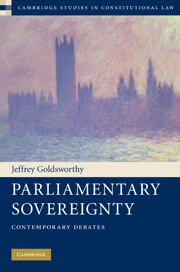Book contents
- Frontmatter
- Contents
- Detailed table of contents
- Acknowledgments
- 1 Introduction
- 2 The myth of the common law constitution
- 3 Legislative sovereignty and the rule of law
- 4 Homogenising constitutions
- 5 Abdicating and limiting Parliament's sovereignty
- 6 Trethowan's case
- 7 Requirements as to procedure or form for legislating
- 8 Judicial review, legislative override, and democracy
- 9 Parliamentary sovereignty and statutory interpretation
- 10 Challenging parliamentary sovereignty: Past, present and future
- Index
- References
2 - The myth of the common law constitution
Published online by Cambridge University Press: 05 October 2010
- Frontmatter
- Contents
- Detailed table of contents
- Acknowledgments
- 1 Introduction
- 2 The myth of the common law constitution
- 3 Legislative sovereignty and the rule of law
- 4 Homogenising constitutions
- 5 Abdicating and limiting Parliament's sovereignty
- 6 Trethowan's case
- 7 Requirements as to procedure or form for legislating
- 8 Judicial review, legislative override, and democracy
- 9 Parliamentary sovereignty and statutory interpretation
- 10 Challenging parliamentary sovereignty: Past, present and future
- Index
- References
Summary
Introduction
The relationship between the common law and statute law is a subject of debate. The controversy goes deeper than questions of interpretation, such as – given the doctrine of legislative supremacy over the common law – why, how and to what extent the meaning of a statute can legitimately be governed by common law principles. The answers to those questions depend partly on more basic issues concerning the legal foundations of the two bodies of law, and their respective status. The orthodox view is that because Parliament can enact statutes that override any part of the common law, statute law is superior to common law. But according to an increasingly popular theory, Britain's ‘unwritten’ constitution consists of common law principles, and therefore Parliament's authority to enact statutes derives from the common law. Sir William Holdsworth once expressed the view that ‘our constitutional law is simply a part of the common law’. For Trevor Allan, it follows that ‘the common law is prior to legislative supremacy, which it defines and regulates’. This theory has become so popular that even the British government has endorsed it. When the Attorney-General, Lord Goldsmith, was asked in Parliament what was the government's understanding of ‘the legal sources from which the legislative powers of Parliament are derived’, he replied, ‘The source of the legislative powers is the common law.’
- Type
- Chapter
- Information
- Parliamentary SovereigntyContemporary Debates, pp. 14 - 56Publisher: Cambridge University PressPrint publication year: 2010
References
- 1
- Cited by

